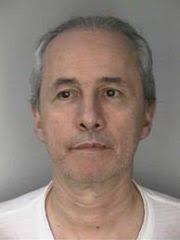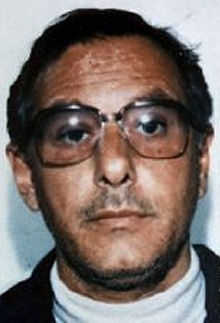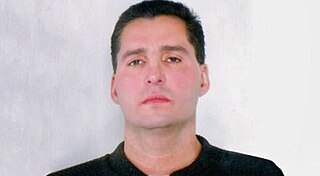The Gambino crime family is an Italian-American Mafia crime family and one of the "Five Families" that dominate organized crime activities in New York City, within the nationwide criminal phenomenon known as the American Mafia. The group, which went through five bosses between 1910 and 1957, is named after Carlo Gambino, boss of the family at the time of the McClellan hearings in 1963, when the structure of organized crime first gained public attention. The group's operations extend from New York and the eastern seaboard to California. Its illicit activities include labor and construction racketeering, gambling, loansharking, extortion, money laundering, prostitution, fraud, hijacking, and fencing.
The Genovese crime family, also sometimes referred to as the Westside, is an Italian-American Mafia crime family and one of the "Five Families" that dominate organized crime activities in New York City and New Jersey as part of the American Mafia. The Genovese family has generally maintained a varying degree of influence over many of the smaller mob families outside New York, including ties with the Philadelphia, Cleveland, Patriarca, and Buffalo crime families.
The DeCavalcante crime family, also known as the North Jersey crime family or the North Jersey Mafia, is an Italian-American Mafia crime family that operates mainly in northern New Jersey, particularly in Elizabeth, Newark, West New York and the surrounding areas. The family is part of the nationwide criminal network known as the American Mafia.

Simone Paul Rizzo DeCavalcante, known as "Sam the Plumber", was an Italian-American mobster who was boss of the DeCavalcante crime family of New Jersey. Claiming descent from the Italian royal family, DeCavalcante was nicknamed "The Count". The McClellan hearings later named the New Jersey Mafia the DeCavalcante crime family since he was the boss of the family at the time of those hearings.
Samuel "Little Sammy" Corsaro was a mobster who belonged to the New Jersey faction of the Gambino crime family. His nickname "Little Sammy" came from his height of 5'5".

Philip Abramo, also known as "The King of Wall Street" and "Lou Metzer", is a caporegime in the New Jersey DeCavalcante crime family who was allegedly involved in security fraud and murder. He is the capo of the DeCavalcante family's crew in Miami, Florida, United States.

John J. DeRoss, also known as Jackie or Jackie Zambooka, is a former underboss in the Colombo crime family.

Louis Vallario, also known as "Big Louie" and "Big Lou", is a member of the Gambino crime family who was a top aide to boss John Gotti and Salvatore "Sammy the Bull" Gravano in the late 1980s.

Girolamo "Jimmy" Palermo was an Italian-born American mobster and longtime underboss of the DeCavalcante crime family in Elizabeth, New Jersey, under the imprisoned boss Giovanni "John the Eagle" Riggi.
Giuseppe "Pino" Schifilliti is a former prominent member of the DeCavalcante crime family since the 1980s, heavily involved in labor racketeering and extortion activities.
George "Big Georgie" DeCicco was a New York mobster and longtime captain in the Gambino crime family. DeCicco is one of the last captains of the old John Gotti administration in the 1980s who have not been under any indictment until now. DeCicco is the brother of former Gambino underboss Frank DeCicco, who was killed in a car-bomb meant for his boss John Gotti, ordered by then boss of the Genovese crime family who is now deceased, Vincent "Chin" Gigante, and Lucchese crime family leaders Vittorio "Vic" Amuso and Anthony "Gaspipe" Casso as revenge for the murder of former Gambino crime family boss, Paul Castellano, a strong ally of both the Genovese and Lucchese crime families.

John "Johnny Boy" D'Amato was an American mobster and former acting boss of the DeCavalcante crime family in New Jersey from 1990 to 1992. He was a prominent made man of the DeCavalcante family and was appointed head of the organization by Giovanni Riggi under the influence of Gambino crime family boss John Gotti. D'Amato was murdered in Brooklyn in January 1992 after he was suspected of engaging in homosexual activity.

Anthony "Tony" Capo was an American hitman in the DeCavalcante crime family who later became a government witness and entered the Witness Protection Program. His aliases included Marshall Beach, Mathew Beach and Wade Beach.

Martin "Marty" Taccetta is an imprisoned New Jersey mobster who was the alleged boss of the Jersey Crew, a powerful faction of the Lucchese crime family.
Frank "Franky the Beast" Scarabino is a New York City mobster and former soldier in the North Jersey-based DeCavalcante crime family,
The Genovese crime family's New Jersey faction is a group of Italian-American mobsters within the Genovese crime family who control organized crime activities within the state of New Jersey. The New Jersey faction is divided into multiple crews each led by a different caporegime who oversees illegal criminal activities in labor racketeering, illegal gambling, loansharking and extortion. The Genovese crime family's New Jersey faction has maintained a strong presence in the Northern Jersey area since the early prohibition era. A number of powerful mobsters within the New Jersey faction such as Guarino "Willie" Moretti, Gerardo "Jerry" Catena and Louis "Bobby" Manna have each held positions within the Genovese family's administration. From the 1990s until his death in 2010, Tino "the Greek" Fiumara was one of the most powerful caporegimes in the New Jersey faction.

Giovanni "John the Eagle" Riggi was a New Jersey mobster and member of the DeCavalcante crime family since the 1940s, before the family had acquired its name. Riggi was the leader of the "Elizabeth crew" in the family when he was a Caporegime. He had been the acting boss during the 1970s and became the official boss around 1982. Riggi was incarcerated at the Federal Medical Center (FMC) Devens, Massachusetts, on extortion and labor racketeering convictions. He was released on November 27, 2012.









